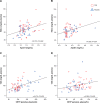Vitamin E tocotrienol supplementation improves lipid profiles in chronic hemodialysis patients
- PMID: 24348043
- PMCID: PMC3849001
- DOI: 10.2147/VHRM.S51710
Vitamin E tocotrienol supplementation improves lipid profiles in chronic hemodialysis patients
Abstract
Purpose: Chronic hemodialysis patients experience accelerated atherosclerosis contributed to by dyslipidemia, inflammation, and an impaired antioxidant system. Vitamin E tocotrienols possess anti-inflammatory and antioxidant properties. However, the impact of dietary intervention with Vitamin E tocotrienols is unknown in this population.
Patients and methods: A randomized, double-blind, placebo-controlled, parallel trial was conducted in 81 patients undergoing chronic hemodialysis. Subjects were provided daily with capsules containing either vitamin E tocotrienol-rich fraction (TRF) (180 mg tocotrienols, 40 mg tocopherols) or placebo (0.48 mg tocotrienols, 0.88 mg tocopherols). Endpoints included measurements of inflammatory markers (C-reactive protein and interleukin 6), oxidative status (total antioxidant power and malondialdehyde), lipid profiles (plasma total cholesterol, triacylglycerols, and high-density lipoprotein cholesterol), as well as cholesteryl-ester transfer protein activity and apolipoprotein A1.
Results: TRF supplementation did not impact any nutritional, inflammatory, or oxidative status biomarkers over time when compared with the baseline within the group (one-way repeated measures analysis of variance) or when compared with the placebo group at a particular time point (independent t-test). However, the TRF supplemented group showed improvement in lipid profiles after 12 and 16 weeks of intervention when compared with placebo at the respective time points. Normalized plasma triacylglycerols (cf baseline) in the TRF group were reduced by 33 mg/dL (P=0.032) and 36 mg/dL (P=0.072) after 12 and 16 weeks of intervention but no significant improvement was seen in the placebo group. Similarly, normalized plasma high-density lipoprotein cholesterol was higher (P<0.05) in the TRF group as compared with placebo at both week 12 and week 16. The changes in the TRF group at week 12 and week 16 were associated with higher plasma apolipoprotein A1 concentration (P<0.02) and lower cholesteryl-ester transfer protein activity (P<0.001).
Conclusion: TRF supplementation improved lipid profiles in this study of maintenance hemodialysis patients. A multi-centered trial is warranted to confirm these observations.
Keywords: end-stage renal disease; hemodialysis; lipid profiles; nutrition intervention; tocotrienol-rich fraction; vitamin.
Figures




References
-
- Collins AJ. Cardiovascular mortality in end-stage renal disease. Am J Med Sci. 2003;325(4):163–167. - PubMed
-
- Schiffrin EL, Lipman ML, Mann JF. Chronic kidney disease: effects on the cardiovascular system. Circulation. 2007;116(1):85–97. - PubMed
-
- Carrero JJ, Stenvinkel P, Cuppari L, et al. Etiology of the protein-energy wasting syndrome in chronic kidney disease: a consensus statement from the International Society of Renal Nutrition and Metabolism (ISRNM) J Ren Nutr. 2013;23(2):77–90. - PubMed
-
- Himmelfarb J, Stenvinkel P, Ikizler TA, Hakim RM. The elephant in uremia: oxidant stress as a unifying concept of cardiovascular disease in uremia. Kidney Int. 2002;62(5):1524–1538. - PubMed
Publication types
MeSH terms
Substances
LinkOut - more resources
Full Text Sources
Other Literature Sources
Medical
Research Materials

